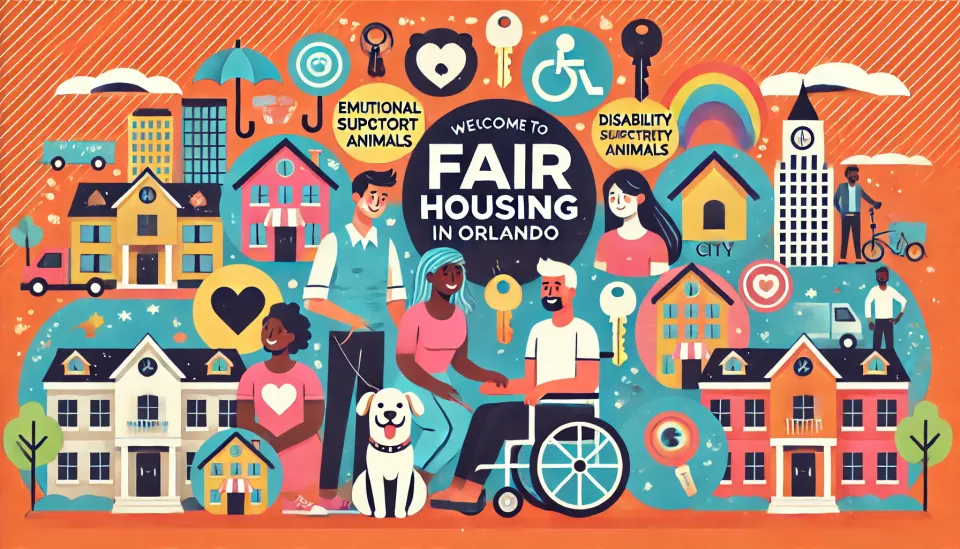Fair Housing in Orlando: Day Two Insights on Rights, Accommodations, and Community Impact

Ever wondered if your landlord can deny you a first-floor apartment because it costs more? Or if emotional support animals require official certification? Day two of the three-part Fair Housing training series hosted by the City of Orlando provided surprising answers and invaluable insights.
In addition to learning, how accommodating is it for the city to provide food and put a spotlight on a local business at the same time? Today’s delicious catering was provided by The Gnarly Cuban, a local gem in Orlando’s food scene.
At The Gnarly Cuban, traditional Cuban dishes are crafted with fresh ingredients and authentic, generational recipes. Run by resilient entrepreneurs, this business turned adversity into success, bringing the comforting heart of Abuelita’s kitchen to every event. Proudly owned by locals, they are deeply involved in community events, bringing their passion for food and heritage across Orlando.
Here are my notes from training:
1. Assumptions Can Reveal Unseen Biases
The class began with an exercise that challenged our assumptions. Participants were asked to guess individuals' backgrounds based solely on their names, and many guesses missed the mark.
- A name like Jillian Chung or Sarah Nguyen might lead people to assume Asian heritage—but both women are Black and Jamaican-born.
For Orlando Realtors and tenants alike, this kind of assumption isn't just incorrect—it’s potentially harmful. When landlords, property managers, or sellers make decisions based on assumptions, subtle discrimination can slip into the process.
📝 Learn more about name discrimination in housing
2. Disability is the #1 Fair Housing Complaint in Orlando
Most people assume race is the top complaint in housing discrimination. That is not true — it’s disability-related complaints, particularly around reasonable accommodations.
Here’s what that means:
- Reasonable accommodations are changes in rules or policies — like assigning a closer parking spot to someone with mobility issues.
- Reasonable modifications are physical changes to the property — like installing a stairlift inside a townhouse.
And here’s the kicker:
- Accommodations are the landlord’s responsibility.
- Modifications (in private housing) are the tenant’s responsibility — but only if they restore the property to its original state when they move out.
If it’s federally subsidized housing, however, the owner may have to cover the cost.
📝 Learn more about reasonable accommodations and modifications under the Fair Housing Act
3. Emotional Support Animals (ESA) and Service Animals Are NOT the Same
This was an eye-opener.
- Online ESA certificates are not valid. If a tenant shows up with one, the landlord can legally request documentation from a medical provider — which could be a doctor, nurse, or social worker.
- Service animals require no documentation. The only two questions a landlord can ask are:
- Is this a service animal?
- What task does it perform?
No pet fees can be charged for ESAs or service animals.
📝 Learn more about ESA and service animal rights from the ADA
4. Discrimination Can Show Up in Surprising Ways
One of the most shocking stories involved a local Orlando complex called Amelia Court. Management there refused to provide key fobs to children, preventing them from accessing their own homes unless they had a cell phone to buzz themselves in. Imagine that — kids effectively locked out of their homes unless they had a working phone.
The policy disproportionately affected families with children, and ultimately, the complex faced legal consequences. Residents who were evicted during this period had their records cleared, their credit repaired, and many received payouts of up to $30,000.
📝 Read more about the Amelia Court case
5. Reporting Discrimination Can Be Risky — But Worth It
Many people don’t report discrimination because they fear retaliation, eviction, or — for some — concerns about their immigration status. The course emphasized that silence often allows discrimination to persist or escalate.
For example:
- A landlord initially pressured a tenant for inappropriate photos in exchange for lower rent. The tenant complied out of fear, only for the landlord’s behavior to escalate. Reporting that kind of harassment earlier could have prevented a tragic outcome.
📝 Know your rights and learn how to report discrimination with HUD
6. Knowing Your Rights in Orlando’s Housing Market
If you’re a tenant, a landlord, or even just someone curious about Orlando’s housing landscape, understanding Fair Housing laws is critical.
- Reasonable accommodations aren’t favors — they’re required by law.
- No child should be denied access to their home because they can’t afford a cell phone.
- Service animals don’t need paperwork — period.
📝 Visit the City of Orlando’s Human Relations page for local resources
7. Practical Advice for Gathering Evidence
If you ever experience discrimination, here’s what the course recommended:
- Document everything. Save texts, emails, and written communication.
- Photograph conditions. If repairs are ignored or certain tenants receive different treatment, visual proof can be powerful.
- Get decisions in writing. If you request an accommodation or modification, ask for their response on paper.
Final Thoughts
I went into this training expecting a dry lecture on legal jargon, but what I got was a reminder that discrimination isn’t always loud and obvious — sometimes it’s quiet, hidden behind policy changes or paperwork.
Whether you're a tenant fighting for your rights or a landlord trying to follow the law, understanding Fair Housing isn’t just about playing by the rules — it’s about ensuring people have a fair shot at living safely and comfortably in their homes.
If you believe you’ve been discriminated against, Orlando’s Office of Human Relations is there to help. Don’t let fear keep you from reporting it — your experience could protect someone else down the line.


